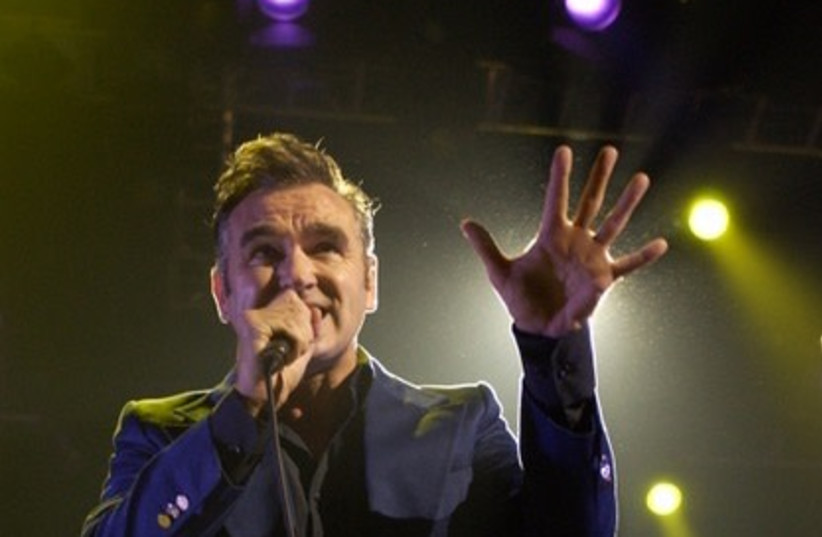Morrissey could have retired in 1987 and his status in the annals of rock ‘n roll would have been impeccable. That was the year The Smiths, the band that the British vocalist founded with guitarist Johnny Marr, broke up after five years of producing some of the most wondrous music coming out of England, since, I dare say, the Fab Four, a couple of decades earlier.
But the now 64-year-old Manchester-raised singer born as Steven Patrick Morrissey refused to fade away and on the contrary, has spent the ensuing decades building a solo career that has brought out the most sparkling (amazing voice, songs and lyrics) and most tiresome (questionable politics and a penchant for canceling shows) elements of his sharp persona to the forefront.
Labeled by the BBC as “one of the most influential figures in the history of British pop,” and by Rolling Stone as one of the greatest rock singers of all time, Morrissey has uniquely made moroseness and loneliness seem desirable. With a cutting wit, a journalist’s eye, a suitcase full of hang-ups and the ability to make bleak seem funny, he’s been called the “Oscar Wilde of rock” and “the greatest-ever lyricist of desire that has ever moaned.”
His nearly a dozen albums under his own name since the demise of The Smiths have only added to the baritone’s reputation as rock’s most potent iconoclast. And Israelis love him.
Why do Israelis love Morrissey?
After a six-year hiatus, lengthened by cancellations due to the COVID pandemic, the affectionately nicknamed “Moz” returns to these shores next week for two shows, July 2 at the Zappa Shuni outdoor amphitheater in Binyamina and July 4 at Expo Tel Aviv.

A vocal supporter of Israel, Morrissey last performed here in 2016. In his song “Israel” from 2017’s Low in High School, he defends Israel against its detractors, singing:
“In other climes, they bitch and whine/Just because you are not like them – Israel, Israel.”
Another tune from the same album is “The Girl from Tel-Aviv Who Wouldn’t Kneel,” which is a reference to a theatrical production of the same name based on the diaries of Etty Hillesum, murdered in Auschwitz in 1943.
When he appeared in Tel Aviv in 2012, he received a symbolic key to the city from Mayor Ron Huldai. And in 2008, he played on a double bill with the revamped legendary 70s garage rockers The New York Dolls, whose reunion they credited to him.
The Dolls’ late guitarist Sylvain Sylvain told The Jerusalem Post at the time that Morrissey, a one-time president of the British New York Dolls fan club before he formed The Smiths, curated the Meltdown Festival in England in 2004 and invited him and the other surviving members – David Johansen and Arthur Kane – to perform together for the first time in decades.
“Morrissey was the main instrument in convincing David [Johansen] to get back together. Morrissey’s always been a big fan of the Dolls. We were fortunate to have him as president of our UK fan club, a self-appointed position. It was a position of love,” said Sylvain.
That love Morrissey felt has trickled down to adoration for The Smiths among latter generations. Last week at the lauded Glastonbury Festival, 80s’ popster Rick Astley joined Britpop band Blossoms, to perform a Smiths-only set for an adoring crowd.
Expect Morrissey to sprinkle some Smiths classics like “There is a Light That Never Goes Out,” and “Last Night I Dreamed That Somebody Loved Me along with his own formidable lineup of now-standards like “Every Day is Like Sunday” and “Suedehead.”
At his 2016 Tel Aviv show, he brought out an aggressive rendition of The Smiths classic “Meat is Murder,” which Post reviewer Sarah Levi described in detail as Morrissey singing “with the same fervor as a teenage girl recently converted to veganism. The performance came complete with bright red lights blaring at us while a giant screen overhead showed gory footage from a selection of slaughterhouses, mostly those of the kosher and halal varietals throughout the US and UK. The pounding and explosive drums and screeching cacophonous guitars evoked the incessant moans and screams of dying animals, while he accusingly shouted the words to the song “as you savor the flavor of murder...KFC is murder.” This went on for nearly 10 minutes until the screeching guitars devolved into a weak whimper, the stage went black and the screen posted a sign in Hebrew reading ‘Meat is Murder’.”
That personifies the unpredictability of seeing Morrissey and is one of the reasons fans are so passionate about him and his music. Both Israel shows will likely be filled because who knows how many more times, if at all, the always-threatening-to-retire singer will continue to tour. Best to grab your misery now.
